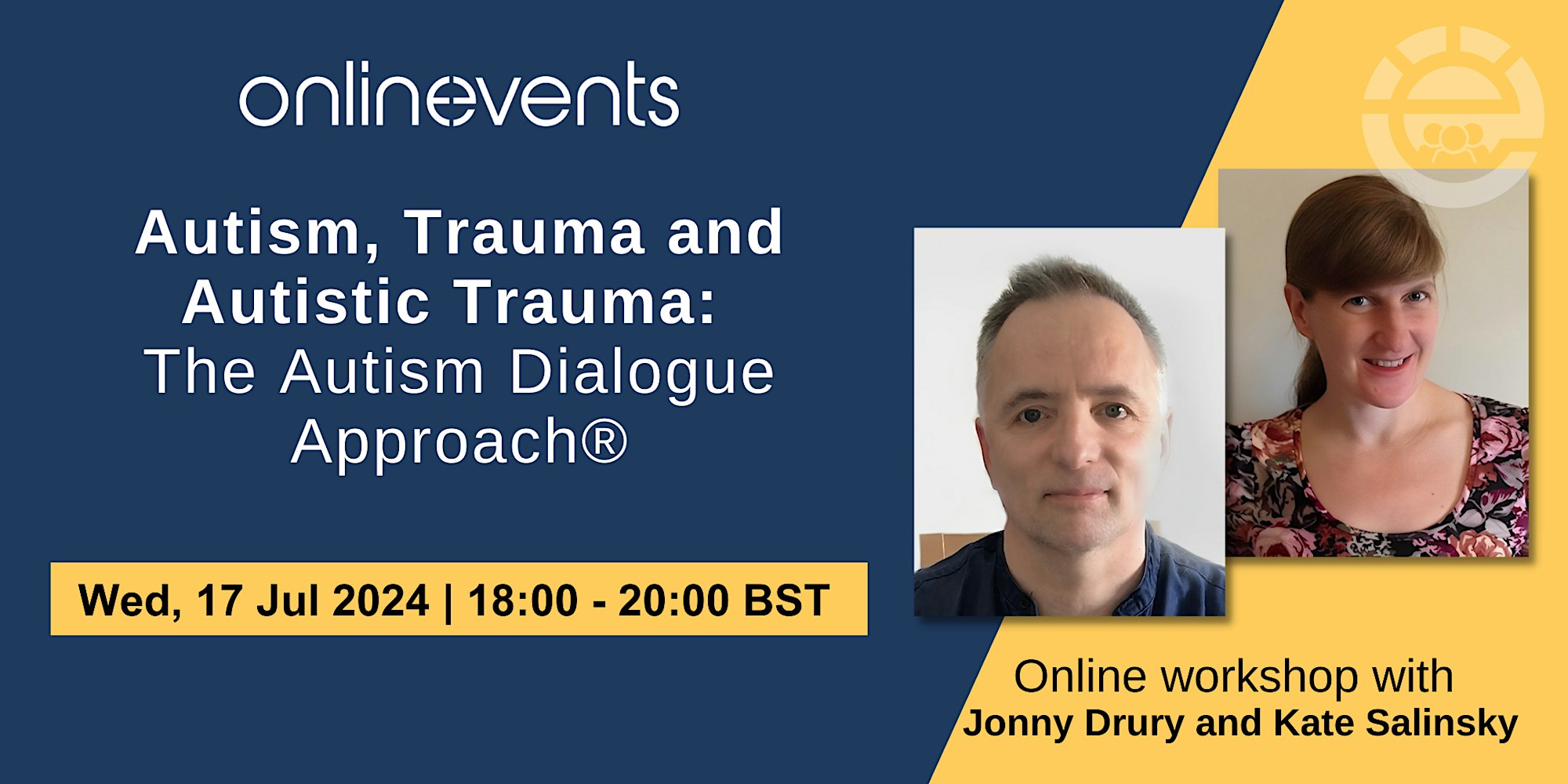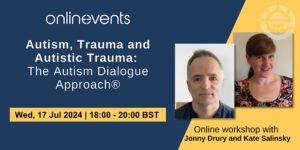About this event
Do you know that autistic trauma is fundamentally different to the standard definition of trauma? As a helper, are you aware you could potentially make things worse for your autistic clients? This is a workshop on an urgent topic by experts in the field, who are currently training trainers in this subject for the Anna Freud Centre, AT-Autism and the NHS on the National Autism Trainer Project.
Join us for a thorough presentation on autistic and related neurodivergent trauma, cumulative post-traumatic stress, new social-cognitive science and working with traumatised autistic clients using elements of the Autism Dialogue Approach®.
Many autistic people present with Autistic (cumulative/complex) c-PTSD, and there are instances where trauma experienced by autistic individuals may not align with current diagnostic criteria. Autistic individuals often encounter a narrative that emphasises neurotypical standards from an early age, which later manifests in mental health and therapy settings through symptoms like flashbacks, dissociation, and delayed emotional processing. Unfortunately, instances of autistic trauma are frequently misunderstood or downplayed as mere ‘drama,’ ‘attention-seeking,’ ‘control-seeking,’ or ‘unwarranted antisocial behaviour.’
One important element of this workshop is ‘masking’ and other trauma responses. Literature has depicted autistic masking as a social tactic—an approach to navigate social scenarios. However, autistic individuals explain that masking isn’t solely about appearing more neurotypical; it involves projecting an acceptable and expected version of oneself to ensure safety in interactions.
Accessing and utilising therapy can clearly be a challenge for autistic and neurodivergent clients, compared to the general population. Equally, therapists are facing major challenges when interacting and communicating across neurotypes, potentially triggering and re-traumatising autistic people. This is in part due to models rooted in behavioural approaches designed by and for neurotypical populations. There will be an opportunity to engage with this and other equally important questions using a safe and inclusive dialogic approach.
Learning Objective Participants Can Expect From This Event
- A thorough introduction to Autistic and Neurodivergent Trauma, complex-post traumatic stress, new social-cognitive science and working with traumatised autistic clients and patients.
- Be introduced to new and emerging practices, including ADA® for addressing autistic and neurodivergent trauma in a range of cross-neurotype helping and therapeutic situations.
- Gain confidence and insight in spotting autistic trauma and in cross-neurotype, relational support and join a fabulous professional network of practitioners, many of whom are neurodivergent.
Who is This Workshop Appropriate For?
- Professionals in relational work, particularly counsellors, psychotherapists, OTs, SLTs, autism coaches, and autism mental health professionals.
How May This Workshop Impact Your Practice?
- ADA trauma-specific applications will place you and your practice at the cutting edge of autistic social cognitive science, and improve access to treatment and outcomes for your autistic clients and patients.
Additional Resources:
- Cassidy, S. A., Robertson, A., Townsend, E., O’Connor, R. C., & Rodgers, J. (2020). Advancing our understanding of self-harm, suicidal thoughts and behaviours in autism. Journal of autism and developmental disorders, 50, 3445-3449.
- Chapman R, Botha M. (2023) Neurodivergence-informed therapy. Dev Med Child Neurol. 65(3):310-317. https://pubmed.ncbi.nlm.nih.gov/36082483/
- De Jaegher H. (2013) Embodiment and sense-making in autism. Frontiers in Integrative Neuroscience, 7(15) http://hannedejaegher.net
- Hogenkamp, L. (2018). Is Autism a Stress Adaptation of Neurodivergent Neurotypes? https://peripheralmindsofautism.com/2018/04/17/is-autism-a-stress-adaptation/
- MacLeod, A., Robertson, C., & Lewis, A. (2013). ““Why should I be like bloody Rainman?!” Navigating the autistic identity”. British Journal of Special Education, 40(1), 41-49. https://doi.org/10.1111/1467-8578.12015
- Miller, D., Rees, J., & Pearson, A. (2021). “Masking is life”: Experiences of masking in autistic and nonautistic adults. Autism in Adulthood, 3(4), 330-338.
- Milton, D. (2012) On the ontological status of autism: the ‘double empathy problem’, Disability & Society, 27:6, 883-887, DOI: 10.1080/09687599.2012.710008
- Murray, D., Lesser, M., & Lawson, W. (2005). Attention, monotropism and the diagnostic criteria for autism. Autism, 9(2), 139–156. https://doi.org/10.1177/1362361305051398
- National Autistic Society & MIND (no date). Good Practice Guide for Professionals Delivering Talking Therapies for Autistic Adults and Children. https://www.mind.org.uk/media/11912/nas-good-practice-guide-a4.pdf
- Pearson A, & Rose K. (2021). A Conceptual Analysis of Autistic Masking: Understanding the Narrative of Stigma and the Illusion of Choice. Autism Adulthood. 3(1):52-60. doi: 10.1089/aut.2020.0043. Epub 2021 Mar 18. PMID: 36601266; PMCID: PMC8992880.
- Rumball, F., Happé, F., & Grey, N. (2020). Experience of trauma and PTSD symptoms in autistic adults: risk of PTSD development following DSM‐5 and non‐DSM‐5 traumatic life events. Autism Research, 13(12), 2122-2132. https://doi.org/10.1002/aur.2306
- Severs, J. (2018). Three golden rules for supporting autistic pupils. Retrieved from https://www.tes.com/news/three-golden-rules-supporting-autistic-pupils
- Sign up to our mailing list: mailchi.mp/1903d109cf81/dialogica
Please note this is a professional development (CPD) event for therapists, coaches and health professionals with invited audience engagement. However, autism and trauma are emotive topics and the sensitive content may trigger deep and unpredictable responses. Facilitators may invite comments at specific points in the programme, and we kindly ask you to share reservedly and be respectful of others and in a timely manner. Thank you for your understanding.
RECORDING
This workshop will be recorded and you can use the ticket function to pre-purchase the recording before the event. This will be useful for colleagues who are not able to attend the event live and also for those who attend the event live and want to watch it again.
ZOOM
This workshop will be hosted on the Zoom meeting platform where we will use our cameras and microphones to interact with each other as a group.
SELF-SELECT FEE
The self-select fee is a radical inclusion policy to open learning for all colleagues. The guide price for this event is £20.00, however, we appreciate that income varies greatly in different locations and circumstances. Please contribute what you can to help us maintain inclusive professional training.
___________________________
All the colleagues at ONLINEVENTS and the presenters we collaborate with are committed to working in a manner consistent with the BACP Ethical Framework, which can be accessed on the link below. When registering for this event you are agreeing to be present and interact in a manner that is consistent with this Framework.
Jonny Drury

Jonathan is a professional dialogue facilitator, consultant, trainer and therapeutic coach specialising in autism, neurodiversity and regenerative approaches to combat systemic trauma. He has a broad background informing his practice including extensive formal training, eastern disciplines, western philosophy and socially engaged art education. He is the co-founder of Dialogica and creator of Mindfulness for Autism® and the Autism Dialogue Approach®.
Website | www.dialogica.uk
Facebook | Dialogica
X / Twitter | @DialogicAction
Instagram | dialogicaction
LinkedIn | Dialogica
Kate Salinsky

Kate Salinsky is co-founder and co-facilitator at Dialogic Action CIC, where she also co-designs and manages training. She has a master’s in Autism, is a trainer at the National Autism Trainer Programme (NHS/Anna Freud Centre/AT-Autism) and parent to a neurodivergent child. Previously, Kate worked as a training manager and counsellor in the voluntary sector for over 20 years, managing a team of trainers to design and deliver accredited training to people working in substance misuse, counselling and mediation.



